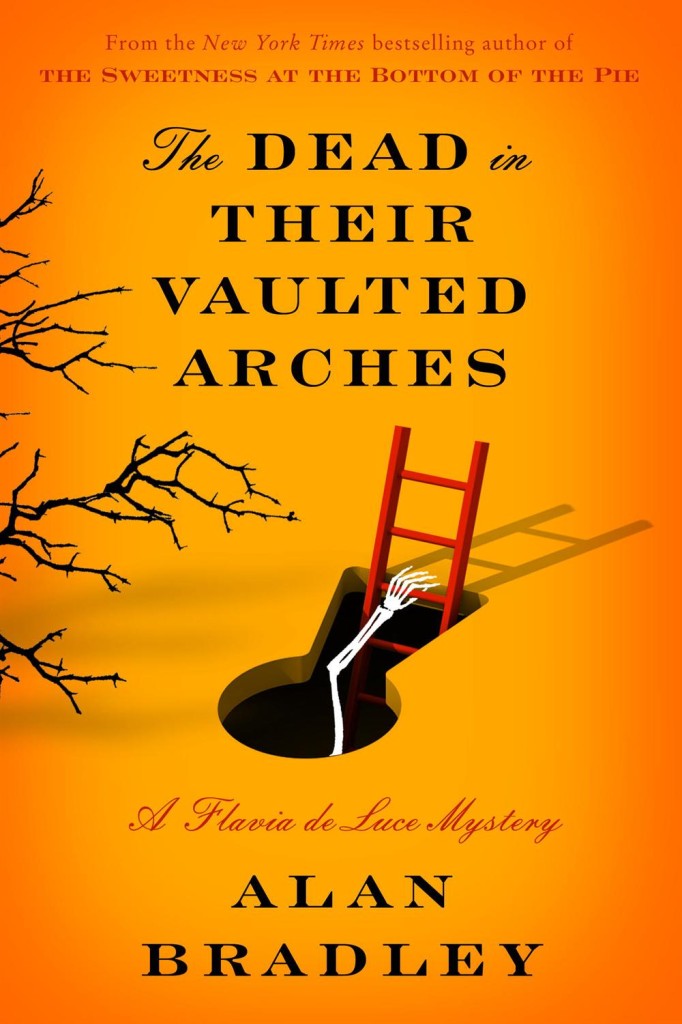Book Jacket:
On a spring morning in 1951, eleven-year-old chemist and aspiring detective Flavia de Luce gathers with her family at the railway station, awaiting the return of her long-lost mother, Harriet. Yet upon the train’s arrival in the English village of Bishop’s Lacey, Flavia is approached by a tall stranger who whispers a cryptic message into her ear. Moments later, he is dead, mysteriously pushed under the train by someone in the crowd. Who was this man, what did his words mean, and why were they intended for Flavia? Back home at Buckshaw, the de Luces’ crumbling estate, Flavia puts her sleuthing skills to the test. Following a trail of clues sparked by the discovery of a reel of film stashed away in the attic, she unravels the deepest secrets of the de Luce clan, involving none other than Winston Churchill himself. Surrounded by family, friends, and a famous pathologist from the Home Office – and making spectacular use of Harriet’s beloved Gipsy Moth plane, Blithe Spirit – Flavia will do anything, even take to the skies, to land a killer.
You can read an excerpt here.
Review:
Oh, Flavia, it’s always lovely to see you again.
Alan Bradley’s latest entry in the Flavia de Luce series has as lovely a voice and character as ever – but as for the plot, well, to me it felt a bit less sure footed.
But first and foremost, the name of the game is Flavia, and our favorite eleven year old’s patented brand of oddball genius, for both chemistry and sleuthing alike, is indeed as delightful as ever, even as she confronts the most emotionally challenging event of her life, in Harriet’s ghost finally being laid to rest. It all brings a lovely sense of culmination, as well as a wonderful through-line of grief and vulnerability, to the story. And seeing Flavia struggle with what she feels and why – and what she’s supposed to do and feel and what she actually does – uncovers a brilliantly crafted touch of maturity in Flavia’s eleven year old self, as we watch her actions reveal just how she has grown over the course of the books. It all was wonderfully done, top to bottom – but lest you think this is an entirely grim and somber tale, rest easy and never fear, for the indomitable Flavia is still very much herself, with as many amusing flights of fancy and wild schemes as ever – she is still eleven, after all.
But – and you knew there was a but coming – while on the character front this book was as bright as ever, for me the plot itself, and the mythos overall, wasn’t quite as steady. The murder mystery honestly felt a bit weak, in that it was by and large left on the backburner, with convenient reveals taking the place of actual sleuthing – because really this story is all about opening the curtain on the del Luce family history, or perhaps I should say mythos. And while on the one hand that was all very interesting, and even I would dare say overdue, on the other I found the direction this book took was one that had my credulity at such an uneasy stretch that a bit more might just have caused it to snap altogether, and that sets a very dangerous precedent going forward. To be frank, the line between history and mythos was crossed, for me, in the family legacy and secrets and so-forth, and for me it was just too much; I just couldn’t entirely buy into the whole scheme, and so it held me back from the story. And while I applaud Bradley, resoundingly, for daring to do what did need to be done, and that is proscribe a definite change for future installments in the series, in terms of the change itself – well, while I vastly approve of the change in, let’s say, scenery, that lies ahead, I also could not help but loft one very dubious eyebrow due to the staging of Flavia’s future – or more accurately, her destiny. And therein, again, lies the problem – that line was crossed, from future to destiny, which for me left the story teetering on the brink of leaving real-world credibility behind – and it stuck in my craw to such an extent that I just could not swallow it. And so we end up with a story that is so concerned with laying the groundwork for The Future that it somewhat strangles the sense of mystery in the present, and worse, strays a bit too far afield in terms of mythology replacing history.
But even with all that said, there is no denying the genius of Flavia’s particular style of narration, the likes of which has no compare, and I loved her struggle with her feelings in this story – so in the end, I would rate this book firmly on a level with the two books that came before (though I will admit, my favorite book of all is still the very first). And even despite my reservations, I do find the sense that change is very much in the air for this series downright alluring, so as always, here’s looking forward to the next Flavia de Luce mystery.
Byrt Grade: A-
As Levar Burton used to say – you don’t have to take my word for it…
I love Flavia. She’s whip-smart, incredibly independent, self-confident, and a completely unrepentant snoop.She quite frankly puts Nancy Drew to shame.
Publishers Weekly (starred review) says:
Flavia retains her droll wit (showing off her encyclopedic knowledge of chemistry, she notes, “Metol, of course, was nothing more than a fancy name for plain old Monomethylparaminophenol Sulfate”). The solution to a murder is typically neat, and the conclusion sets up future books nicely.







Leave a Reply